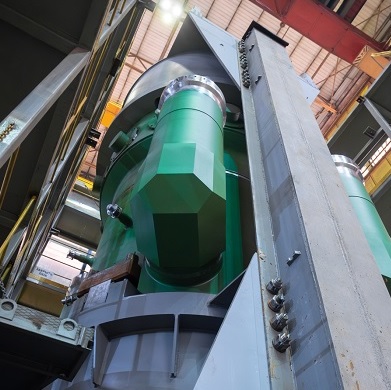 |
||
|
ROSATOM manufactures first bundles of BN-800 MOX fuel with minor actinides Communications Department of TVEL Fuel Company of Rosatom, PUBLISHED 10.12.2023 ROSATOM's Mining and Chemical Combine in Zheleznogorsk, Krasnoyarsk region, has manufactured the first three fuel assemblies with uranium-plutonium MOX fuel, which contain in their fuel matrix not only plutonium, but also other transuranic elements - americium-241 and neptunium-237. The fuel bundles have been successfully accepted and will be loaded into the BN-800 fast neutrons reactor at the Beloyarsk NPP in 2024. The innovative fuel will undergo pilot operation (lead-test assemblies program) during three micro-campaigns (approximately one and a half years). Minor actinides are all other transuranic elements other than plutonium that are formed in irradiated nuclear fuel as the result of nuclear reactions during operation in a reactor core. Like plutonium, these elements do not occur in the nature, but arise only from transmutation of uranium. Neptunium, americium and curium isotopes are particularly important to radiochemists because of their significance in spent nuclear fuel reprocessing and radioactive waste management. These elements are highly radioactive and toxic, generate much heat, have long half-lives, and are in fact the most hazardous components of nuclear waste. The Russian solution for the minor actinides problem should be innovative fast neutron reactors. These installations may be fueled not only by enriched natural uranium, but also by secondary products of the nuclear fuel cycle, such as depleted uranium and plutonium. In addition, the research shows that minor actinides from spent nuclear fuel under the flux of fast neutrons will fission into fragments representing a fairly wide range of radioactive and stable isotopes, but in general their potential hazard will be much lower than that of the original minor actinides. The transmutation process of minor actinides is also called "afterburning" in a reactor. "ROSATOM is step by step taking the unique advantages that powerful fast neutron reactors provide to our industry. Introduction of MOX fuel enables to expand the resource base for nuclear power multifold involving depleted uranium and plutonium, and also to reprocess irradiated fuel instead of storing it. Afterburning of minor actinides is the next step in closing nuclear fuel cycle, which should not only reduce the amount of nuclear waste for final isolation, but also significantly reduce its radioactivity. In the long term, it would enable to avoid the complicated and expensive deep burial of waste," commented Alexander Ugryumov, Senior Vice President for Research and Development at TVEL Fuel Company of Rosatom. Topics: NFC, Rosatom, TVEL, Fast breeders Other news: Lepse Floating Technical Base Dismantlement Project has been successfully implemented To discharge spent nuclear fuel, the Lepse was placed in a specially designed and built onshore sheltering site. This made it possible to prevent any weather effects. IAEA has issued a technical document on global inventories of secondary uranium supplies The document provides a comprehensive assessment of publicly available information on current secondary uranium supplies, including at the regional and national levels. China makes a major breakthrough in obtaining kg-level molybdenum isotopes The remarkable achievement was made through independent research and development. |
Hero of the day 
ROSATOM completed production of RITM-200 for Chukotka icebreaker This is the last reactor that the company is manufacturing under the valid contract for the supply of power units for the new generation nuclear-powered ships. After having been prepared for transportation, the reactor will be delivered to the Baltic Plant. INTERVIEW
CNNC OPINION
WANO |

